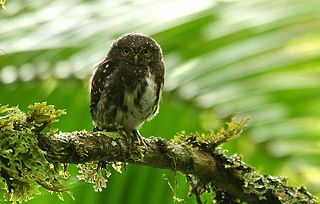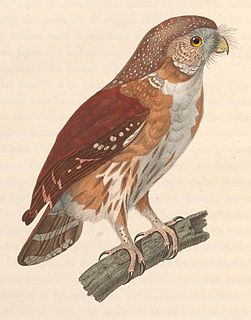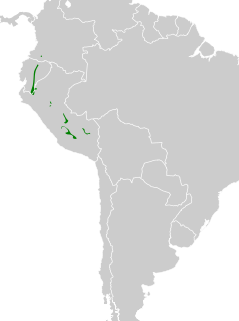
The sharp-shinned hawk is a small hawk, with males being the smallest hawks in the United States and Canada, but with the species averaging larger than some Neotropical species, such as the tiny hawk. The taxonomy is far from resolved, with some authorities considering the southern taxa to represent three separate species: white-breasted hawk, plain-breasted hawk, and rufous-thighed hawk. The American Ornithological Society keeps all four variations conspecific.

The ferruginous pygmy owl is a small owl that breeds in south-central Arizona and southern Texas in the United States, south through Mexico and Central America, to South America into Brazil, Bolivia, Paraguay and Argentina.

The pygmy nightjar is a species of nightjar in the family Caprimulgidae. It is endemic to Brazil.

The eared poorwill is a species of nightjar in the family Caprimulgidae. It is endemic to Mexico.

The Chocó poorwill is a species of nightjar in the family Caprimulgidae. It is found in Colombia and Ecuador.

The Yungas pygmy owl, is a species of owl in the family Strigidae. It is found in Argentina, Bolivia, and Peru.

The collared owlet, also known as the collared pygmy owl, is a species of owl in the family Strigidae. Its natural habitat is submontane and montane forests with open spaces and is distributed throughout oriental Asia. It is the smallest owl in Asia, at 15 cm (5.9 in) and 60 g (2.1 oz).

The Costa Rican pygmy owl is a small "typical owl" in subfamily Surniinae. It is found in Costa Rica and Panama.

The Central American pygmy owl is a species of owl in the family Strigidae. It is found in Belize, Colombia, Costa Rica, Ecuador, Guatemala, Honduras, Mexico, Nicaragua, and Panama.

The Andean pygmy owl is a species of owl in the family Strigidae. It is found in Colombia, Ecuador, Peru, and Venezuela.

The East Brazilian pygmy owl, also known as least pygmy-owl or Sick's pygmy-owl, is a small owl in the typical owl family.

The austral pygmy owl is a species of owl in the family Strigidae. It is found in Argentina and Chile.

The cloud-forest pygmy owl is a short, muscular, small-sized species of owl found throughout the Andes of western Colombia and north-western Ecuador, being confined to cloud forests between 900–2000 m a.s.l. Below this altitudinal range the Central American pygmy owl occurs; above it, the Andean pygmy owl occurs.

The Colima pygmy owl is a species of owl in the family Strigidae. It is endemic to the western part of Mexico.

The subtropical pygmy owl is a species of owl in the family Strigidae. It is found in Bolivia, Colombia, Ecuador, and Peru.

The Pacific pygmy owl or Peruvian pygmy owl is a small "typical owl" in subfamily Surniinae. It is found in Chile, Ecuador, and Peru.

Koepcke's screech owl is a species of owl in the family Strigidae. It is endemic to Peru.

The West Peruvian screech owl or Peruvian screech owl is a species of owl in the family Strigidae. It is found in Ecuador and Peru.

The Baja pygmy owl or cape pygmy owl, is a subspecies of northern pygmy owl restricted to the Mexican state of Baja California Sur. Although some taxonomists, including the International Ornithologists' Union, consider it to be a distinct species, other authorities, including the American Ornithological Society, do not consider it separate, and consider it to be a subspecies of the northern pygmy owl.

The Guatemalan pygmy owl is a small "typical owl" in subfamily Surniinae. However, some taxonomic systems consider it to be a subspecies of northern pygmy owl. It is found in Mexico, Guatemala, and Honduras.























